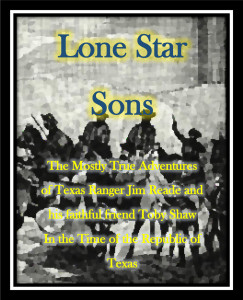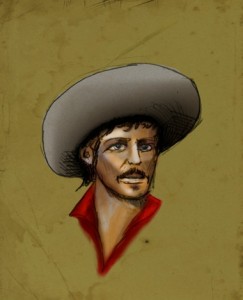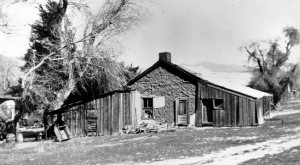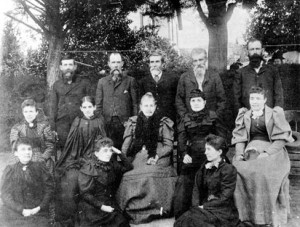 (All righty then – another in the serial adventure of Lone Star Sons – a reworking of a certain classic Western serial, wherein our heroes go adventuring, searching for the lost silver treasure of the old presidio of San Saba. Previous chapters are here and , here and previous adventures are linked or are on this page.)
(All righty then – another in the serial adventure of Lone Star Sons – a reworking of a certain classic Western serial, wherein our heroes go adventuring, searching for the lost silver treasure of the old presidio of San Saba. Previous chapters are here and , here and previous adventures are linked or are on this page.)
At the door of the mansion where the Biddles were hosted, Jim was received with all courtesy and directed to a suite of small rooms adjoining the garden. Windowless on the outer walls, the parlor and sleeping chambers opened into a covered arcade overgrown with sweet-smelling jasmine – an arcade which almost constituted a room in itself, set about with bright-painted pots of flowering geraniums, and a number of chairs made of roughly carpentered wood and upholstered with rawhide in the local fashion. There was also a small table, pressed into service as a desk, which was piled with much paper, an inkwell and an ordinary schoolchild’s slate, much scribbled over with chalk markings. Here Albert Biddle had been at work … and a scattering of dolls and children’s toys testified that Albert had combined duty with domesticity. Out in the garden, in the paved area by a mossy and trickling fountain, Dona Graciela’s two daughters rolled a ball back and forth for the amusement of the small child who had become his and Toby’s god-son, and Albert’s son. Little James Toby Albert was now a small boy just able to toddle in his plain baby-dress, who gurgled with delight whenever he managed to capture the ball. Usually this came at the cost of sitting down heavily on his diapered behind.
“He’s still in small-clothes, I see,” Jim observed. “At least that makes me feel that not so much time has passed.”
“They do grow up fast,” agreed Albert Biddle, with an air of superior knowledge which Jim found faintly annoying – especially as every time that he visited Rebecca in Bastrop it seemed like hers and Dan’l’s daughter had grown another six inches. It wouldn’t have surprised him in the least to see on his next visit that the girl had put up her hair and let out the hems of her skirts to the length appropriate to a young lady. That was a slightly uncomfortable thought, and Jim put it aside with an effort.
“How goes the deciphering?” he asked, and Albert Biddle grinned.
“Very well, actually. I’ve pretty well deduced the area where the treasure was buried – in the north-east corner. The old boy wasn’t that much of a hand in coming up with a cipher … but the thing that worries me is that others might have knowledge of the treasure at San Saba. It was a military garrison, after all – and he was not the only officer. If he knew of it, then others knew as well. Gracie says that the old boy had some mighty strange visitors in his last days. From what she says of one of them, I’m wondering if it is our old friend of the Casa Wilkinson…”
“Don Esteban Saldivar?” Jim ventured. “Logical, I suppose – since it was a matter for Spain…”
“No – the Englishman; the actor.” Albert Biddle’s pleasant and anonymous features bore an expression of distaste. “Gracie said he had a voice that sounded like he was speaking to a multitude, so I thought of him at once. Does he have friends in Mexico, I wonder?”
“I saw a man by San Fernando,” Jim answered, with a feeling of foreboding. Yes, the man playing mumbley-peg against himself was the age and build of the English actor and paid agent. And had not Jack said something about a fellow he thought looked familiar, when he saw Dona Graciela and Albert Biddle and their family and train? “This very day, as I was coming to call; I thought he looked like someone I knew, but he looked down, as if hiding his face, so I cannot be entirely certain it was Vibart-Jones … But he had the color and bearing, although he was dressed as a Mexican grandee. Jack said something about seeing someone following you, the thought – the day that you returned to Bexar. Why do you ask if Vibart-Jones has friends in Mexico?”
“There were English bankers and investors left bankrupt by Texian independence,” Albert Biddle explained. This matter was meat and drink to his clerkly soul. “They had made loans to Mexico secured by vast tracts of lands in Texas. Once Mexico lost the war, they lost control of the lands and couldn’t repay the loans … and the English bankers and their investors went bust. I’ve heard tell of English bankers and pamphleteers who wouldn’t mind in the least if Mexico had a chance to win over Texas, throw us all out and retrieve their fortunes.”
“Reclaiming the San Saba treasure would comfort them mightily,” Jim finished the thought. “Yes, it would make sense, especially if they could extract it from under our very noses. Albert – I think it advisable that we leave soon, and unobserved. You or I – perhaps both of us, I cannot say for certain – we are being watched. Old Bexar has a thousand eyes. Cap’n Hays used to have a camp out on the Salado north of town – for his Rangers patrolling the hills, so that they might come and go unobserved.”
“I agree about leaving immediately.” Albert Biddle nodded. “What stratagem do you propose regarding keeping our departure a secret?”
“Make no change from your routine,” Jim was already thinking, planning an unnoticed departure. “But come to visit us tonight when you return from Compline. I’ll have a horse for you, and all that is necessary for the journey – the stable is behind the house, with high walls on every side. No one can observe preparations for a journey unless they are within the house and yard. Act as if everything is utterly normal – but Cap’n Hays will assume your overcoat, and accompany Dona Graciela to this house, while you and I wait until the wee hours. Say nothing to anyone – not even to your lady until the moment of departure.”
“My wife’s honor is my own,” Albert Biddle’s voice was frosty with displeasure. “Sir, I will not abide any hint of doubts regarding her loyalty, from you or anyone else.”
“I think of her safety, and that of the children,” Jim answered. “I did not mean to insult her – only that I consider that if she does not know of our departure beforehand, she will not be put to the burden of lying – or to the effort of guarding herself among her friends and kin. You may attest to the trust that you have of your wife, which I am certain is not misplaced, as she is a noble and virtuous lady. But consider this – do you assign the same trust in your your hosts, and most particularly their servants … their friends, and those hangers-on who are quick to bear any rumor that someone might pay a peso or two for? Do you trust them, in equal measure?”
“Likely not,” Albert Biddle’s expression relaxed, and he cast a fond look out into the garden, where his stepdaughters and little god-son continued to play. Happy and handsome children, without a care in the world, not burdened with knowledge of the efforts of their elders and men like Captain Hays, which labors kept them safe, secure and happy, laughing as they romped beside a garden fountain in the old quarter of Bexar.
“I will make it square with you and your lady,” Jim suggested. “When you visit tonight, I will say that we have only just received a message of the most urgent nature. We may then depart at once, without giving her any cause for unhappiness with you.”
“A very fair suggestion,” Albert Biddle looked relieved. “Then, I will work thru the afternoon on this puzzle, and perhaps by the time we arrive at the old fortress I will have pin-pointed the exact location.”
“Good,” Jim answered. “I do not relish the thought of searching and digging through old stone-work for any longer than we must. Old Mopechucope might have promised friendship and hospitality to Toby and me, but I don’t want to lean on that reed for any longer than we have to.”
It went as planned, that evening: Albert Biddle and Dona Graciela attended Compline, and as soon as Jack answered the knock on his door, saying,
“There’s been an urgent message – you and Jim must leave tonight. There is danger – we are all being watched.”
“Any notion of whom?” Albert Biddle answered, as briskly as a well-rehearsed actor, as Jack closed the door on the evening clamor in the Plaza outside, with the swifts dipping in and out of the gardens on either side – dark shadows in the pale twilight.
“No – but the safety of your mission depends on absolute secrecy respecting your movements. Fifteen minutes – and then I shall put on your coat and accompany your wife to the casa.”
“It is sudden, querida,” Albert Biddle answered. “I know – but I have expected such a message for some days…”
“If you wish some few private moments for a farewell…” Jack said, already taking his topcoat from the peg where it hung. “Jim and I will step out to the stables…”
“There is no need, “Dona Graciela replied, her voice firm, the expression of her face resolute. “Go with God, Alberto. He will protect you … until you return.” She kissed Albert Biddle once. “I trust that it will not be many weeks on this errand of yours?” She let the question hang in the air, until Jim assured her.
“He will return before many weeks have passed, Dona – my word as a gentleman and a Ranger upon it.”
“Mine also, Mrs. Biddle,” Jack added.
“Very good.” Dona Graciela answered, stalwart as if she were a soldier herself. “I will hold you to that promise, Senors.”
“She will, too,” Albert Biddle whispered to Jim as he and Jack exchanged coats and hats – Jack’s hunting coat for Albert Biddle’s old-fashioned coachman’s overcoat. “She’s that kind of woman.”
In a moment, they were gone, Jim having turned down the lamp-wick to a bare golden glow, so that no one might see Dona Graciela and the disguised Jack clear in the doorway.
“And now?” Albert Biddle whispered, as Jim barred the door behind them.
“We wait until the moon sets,” Jim answered. “May as well sleep until then. Jack will come back by the stable – he has a key to let himself in.”
“Nothing happens at that hour, I always used to say,” Albert Biddle mused. “The good folk are still asleep in bed, and those otherwise inclined are the worse for drink – whatever devilment they wish to do, they have already done.”
“That and it will be as dark as the inside of a bull with the tail clamped down,” Jim pointed out … with a fair degree of accuracy, as it turned out.
Jack returned, well after midnight, with Albert’s coat rolled up in a bundle underneath his arm. “All in order,” he added, somewhat reproachfully at Jim, who had unshipped one of his patent Colt revolvers, when he had heard something scratching at the door that led into the stable. “There was no need for you to stand guard, Jim.”
“There is, always,” Jim returned evenly. “Even in your own quarters … Cap’n.”
“Perhaps you are right to do so,” Jack acknowledged. “Right then – your saddlebags an’ traps an’ all are ready to go?”
“We’ve been ready to go for hours,” Albert Biddle yawned – and they had. All that was required was to saddle their horse, and the pack-mule with the tools and supplies they had chosen – and leave, as stealthily as Jack had returned.
“See you by mid-summer,” Jack said, then. “Or before … and if I don’t, then I guess Mopechucope wasn’t as good a friend as all that.”





Recent Comments